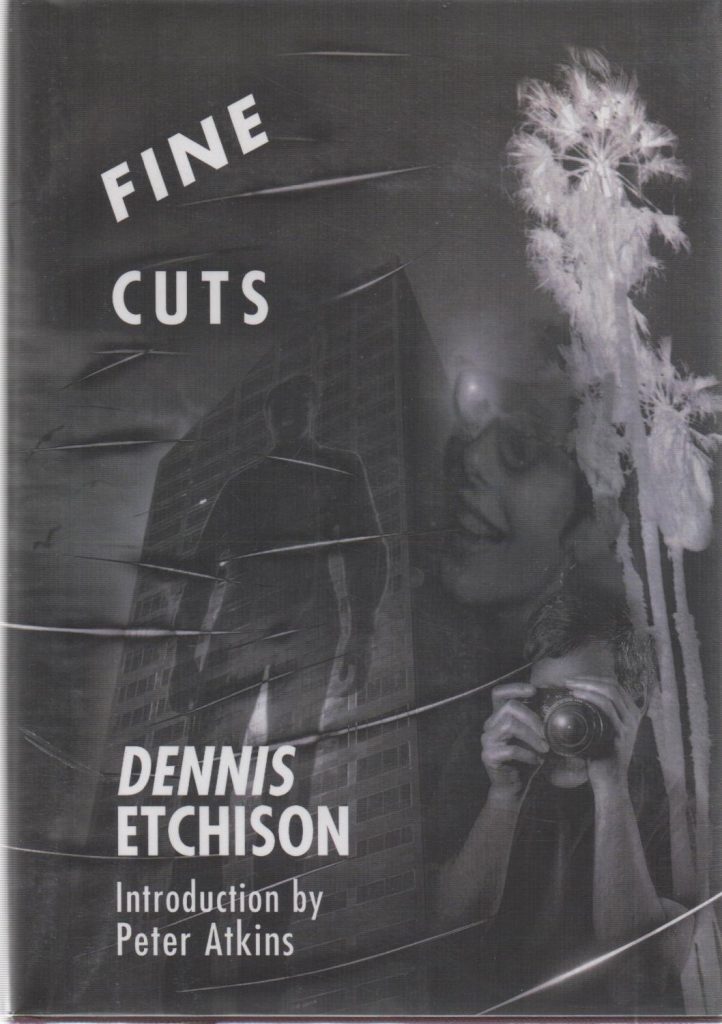About fifteen years ago I was given a book to review by the then editor of Vector – it was Fine Cuts, by Dennis Etchison. It was the first book I’d read by him, but in a (too brief – he didn’t write enough) binge I immediately tore through the rest of them. There was something about his slightly sly, slightly sparse style that really appealed to me. Since he’s passed away today, I thought I’d dig out that old review and put it up.
Fine Cuts by Dennis Etchison (PS Publishing, 2004)
I have never been to the USA, yet through television, film and books I have the idea that I know many of its cities intimately. They’re not communities or centres of commerce, they’re movie stars – no more substantial and no less the fruits of conscientious image manipulation. And, like John Wayne or Clint Eastwood they may appear in different stories, they may get cast in different roles, but they always play themselves.

I have a soft spot for New York, that I imagine as a braggart that blusters and boasts to disguise a sentimental core. Washington’s capitol might shine like a beacon but it can’t disguise the fact that its foundations are in the swamp. Las Vegas would fiddle while Rome burned if it wasn’t busy looting everything not nailed down.
But, of all the American cities, Los Angeles has the firmest grip on my imagination. It shines like a jewel in the films of Michael Mann (Heat and Collateral) but, like a dame in a Chandler story, it’s really as dangerous and duplicitous as Jake Gittes’s Chinatown. Los Angeles burns through natural resources (oil on its freeways, water on verdant desert lawns, human talent in its business) with a reckless disregard for renewal while poverty and racial tension gnaw at its foundations.
It’s a terrible city and yet it is also irresistible.
In story after story throughout Fine Cuts, Dennis Etchison captures this weird, scary but compulsively fascinating place perfectly.
I must confess that I was completely unaware of Dennis Etchison before receiving this book to review so I should point that many of you may already be familiar with the stories contained here. Fine Cuts contains no new work by an author whose output falls some way short of prolific. The twelve stories included in this volume by PS Publishing first appeared between 1973 and 2001 and most (perhaps all) have previously been collected elsewhere.
Still, as a jumping on point for new readers, this volume is very rewarding and I think even those familiar with Etchison’s work may find the decision to group these particular stories – all of which share Hollywood and the associated media industry as a setting or theme – rewarding.
There is nothing gothic about Etchison’s writing style – his prose is spare, almost invisible but his stories have a knack for getting under your skin, upsetting your equilibrium and re-emerging from your subconscious days later in disturbing and unexpected ways. Perhaps my favourite of all these stories is “The Dog Park” which, on the surface, is simply about a man returning to a park to look for his lost pooch, but Etchison invests it with a powerful sense of loss and desperation.
That idea of having lost something – missed opportunities, wasted talent, vanished innocence – and being unable to escape the consequences of that loss permeates these stories. In “Deadspace”, “When They Gave Us Memory”, “Inside the Cackle Factory”, “The Spot” and “Deathtracks” the characters become trapped in relationships or patterns of living from which they cannot drag themselves free. In “Calling All Monsters” and “The Late Shift” Etchison traps his characters in their own bodies, to quite chilling effect. This is a landscape where no one wins, even those that have made it big – like the former child-star in “The Last Reel”, the actress in “I Can Hear The Dark” or the game show host in “Gotta Kill ‘Em All” – soon come to realise that success is fleeting and that it is without substance or worth.
Like the sun-bleached skull of a steer in the Californian desert, Etchison’s characters are stripped bare, their pretensions torn away, their hopes shredded until all that’s left is a brittle shell. But these aren’t dour stories. I found that I read most of them with a grin on my face – Etchison has a sardonic wit that surfaces (albeit sometimes quite nastily) in almost every tale.
The humour is one key factor in leavening what might otherwise be a rather stodgy collection. The other is that no matter how much Etchison highlights the soul-sucking banality and insincerity of Los Angeles, he returns again and again to describe in intimate detail the city and its people. He is clearly, in his own way, in love with this city and seems no more capable of escaping Los Angeles than the characters in his stories.